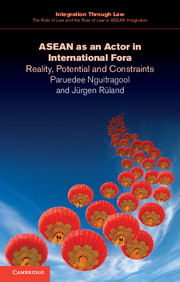Book contents
- Frontmatter
- Contents
- List of tables
- General editor's preface
- Acknowledgements
- List of abbreviations
- 1 Introduction
- 2 Analytical framework: a cognitive approach of externalization
- 3 ASEAN's cognitive prior and negotiating capacities
- 4 ASEAN as a negotiator in global fora: stages of negotiation
- 5 ASEAN as an actor in global fora: negotiation strategies
- 6 Case studies
- 7 Conclusions and future options
- Executive summary
- References
- Index
1 - Introduction
Published online by Cambridge University Press: 05 May 2015
- Frontmatter
- Contents
- List of tables
- General editor's preface
- Acknowledgements
- List of abbreviations
- 1 Introduction
- 2 Analytical framework: a cognitive approach of externalization
- 3 ASEAN's cognitive prior and negotiating capacities
- 4 ASEAN as a negotiator in global fora: stages of negotiation
- 5 ASEAN as an actor in global fora: negotiation strategies
- 6 Case studies
- 7 Conclusions and future options
- Executive summary
- References
- Index
Summary
This book is part of a larger project entitled “Integration through Law.” As the project title suggests, the organizers believe that accelerated legalization, contractualization and, perhaps, even constitutionalization are among the key drivers of regional integration. Greater legalization creates a more rules-based type of regional cooperation with binding obligations for the members and is associated with the expectation that it makes cooperation more enduring, predictable and effective. With precisely these objectives in mind, the leaders of the Association of Southeast Asian Nations (ASEAN) passed the ASEAN Charter, a quasi-constitutional landmark document, in late 2008. In their view, legalization is a requisite not only for a deeper-integrated regional grouping, but, in particular, also a more cohesive one as well. In a globalized world, in which the lives of Southeast Asians are increasingly affected by decisions made far beyond their region in arcane bodies of international organizations, regional cohesion is not only direly needed to settle complex regional cross-border problems but also to develop the “voice opportunity” (Grieco 1996) essential for negotiating successfully in global forums. In other words, cohesion has not only an intra-regional dimension but also an extra-regional one.
This extra-regional dimension of cohesion is the main theme of this book. Regional organizations have proliferated since the early 1990s, mainly in the Global South. With this new wave of regionalism, there are no longer “regions without regionalism” (Palmer 1991). Since then, in an increasingly vertically and horizontally differentiated emerging system of global governance, regional organizations have more and more been becoming actors in their own right (Röland 2010). On first sight, this may appear surprising given the fact that all newly formed regional organizations are intergovernmentalist in nature. Yet the increasing actorness of regional organizations has been well documented in the field of interregionalism studies (Hänggi, Roloff and Röland 2006; Doidge 2011; Wunderlich 2012). And with increasing actorness regional organizations also adopt collective actor roles in global forums, mainly to strengthen the bargaining power of smaller countries in particular.
- Type
- Chapter
- Information
- ASEAN as an Actor in International ForaReality, Potential and Constraints, pp. 1 - 7Publisher: Cambridge University PressPrint publication year: 2015

